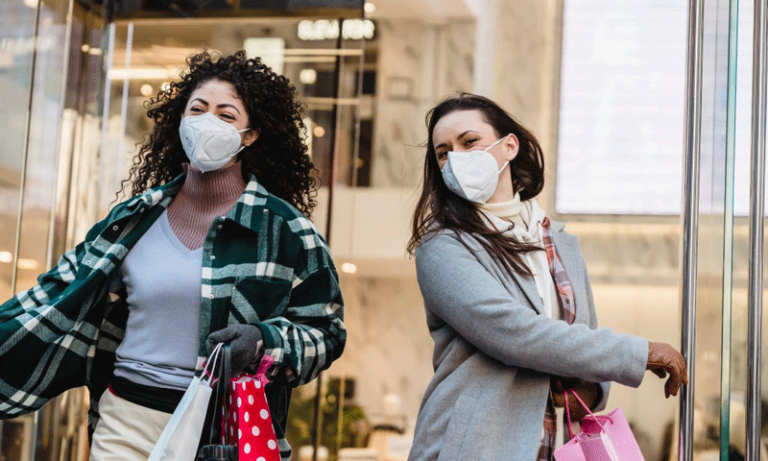Although government agencies, hospitals, and non-profits have been at the forefront of fighting COVID-19 through providing vaccinations, education, and public outreach, some businesses have also joined the battle by providing funding to assist first responders with acquiring PPE or increasing their own R&D for vaccine research. Also, some are requiring masks and vaccinations for their employees or customers, or providing incentives for people to get vaccinated. As vaccination rates increase and more people are getting comfortable getting back into their normal routines which include frequenting their favorite restaurants, and going to sporting and live music events, adequate preventative measures are needed to stop the spread especially from those who are unvaccinated. With the surge of the Delta variant, more needs to be done to keep people protected, and this is why businesses are taking an increased interest in combating COVID.
The Delta variant is surging at a rapid pace and containing it is going to take a lot of work and collaborative effort. If cases increase, there’s the potential threat of more lockdowns which will further impact businesses especially small businesses that have already suffered during the pandemic either through lost profits, lack of adequate staffing, or temporary or permanent closures.
“We barely survived the shutdown,” said Tracy Henderson, the general manager at the Marquee Theatre in Tempe, Ariz. “We were down for 13 months, and if we have to be shut down again, we’re not going to survive it just like many of the venues – they’re not going to survive it.”
With the exception of two office staff members, the venue laid off all of its employees, and the owner of the theatre went into personal debt to buy the things that were needed to reopen.
The Nash, a non-profit jazz club in Phoenix, Ariz., did not need to lay off its workers when they closed down as they relied on the Paycheck Protection Program (PPP) loan through the U.S. Chamber of Commerce as well as other economic injury and COVID relief grants. However, it still lost 60 -65% of their earned revenue, according to Steve Maun, the venue’s managing director.
In August, the Marquee Theatre and Nash joined other Arizona venues, including Phoenix’s the Nile and Crescent Ballroom, and Tucson’s the Rialto, in an effort that requires both visitors to their venues, as well as artists, to show proof of full vaccination or a negative COVID-19 test within 72 hours to attend events. Venues would have needed to implement this by September 20.
Major companies have required their employees to get vaccinations to either come into the office, or to even keep their jobs. Businesses are requiring masks and/or proof of vaccinations or negative COVID tests before patrons can enter their premises. Sports teams such as the Portland Timbers and Thorns, New Orleans Saints, and some college teams will require proof of vaccination or a negative test in order for fans to attend games. Both Uber and Lyft partnered with the Biden Administration to offer free or discounted rides to vaccine appointments to assist with reaching the 70% vaccination goal, and Krispy Kreme brought back its free doughnuts for vaccination campaign for a limited time for one week between 8/30-9/5 to anyone who showed their COVID -19 Vaccination Record card. These are just part of the different things, including various perks and incentives, businesses have been doing to entice the public to get vaccinated and to stop the spread.
It’s no surprise some of these requirements are getting pushback including from some government officials. Florida Governor Ron Desantis signed a bill earlier in the year, that went into effect September 14, that fines $5000 to some businesses that would require customers and visitors to show proof of vaccinations. This went into effect on September 14. Some fans are bemoaning their team’s vaccination and testing requirements. Even some small businesses are fighting against mask mandates implemented by their cities.
Though he said feedback from the public has mostly been positive, Maun has received a dozen or so emails from patrons and non-patrons alike indicating they would not purchase tickets anymore or donate –even if they were not in the venue’s database as donating or purchasing tickets in the past. However, at a previous show, the venue did have attendees who only went because the venue instituted the vaccination or testing requirement.
Henderson echoed that feedback has mostly been positive and some people thanked the venue for being responsible and taking care of the public. She, on the other hand, has received some negative feedback including two death threats.
In the end, both say the requirements are necessary not only for their businesses, but also to protect the public.
Maun said that even prior to the agreement reached by the venues, the Nash was considering implementing a similar requirement when COVID cases started increasing significantly, not only to prevent the venue from encountering the same financial problems it experienced during their closure, but to keep their fans and musicians safe.
Tracy Henderson also provided some additional insight. “It’s just going to be up to us to try and eradicate the progression of [COVID],” she said. “And now with all the variants that are coming out, we don’t want anyone else to die. We don’t want anyone else to get sick.”
If you’re looking to write stories about how your local businesses are helping with the fight against the coronavirus, here are some things to consider:
· How has the business been impacted by the COVID pandemic?
· If a business has adopted a mask, vaccination, or testing requirement, why did it feel it was important to do so? If not, why?
· Is there a discrepancy in requirements between businesses based on region or locality?
· Are these requirements more prevalent within certain industries or establishments?
· What has been the overall feedback from the customers and the general public towards the establishment’s policies? Has it impacted sales or patronage?











